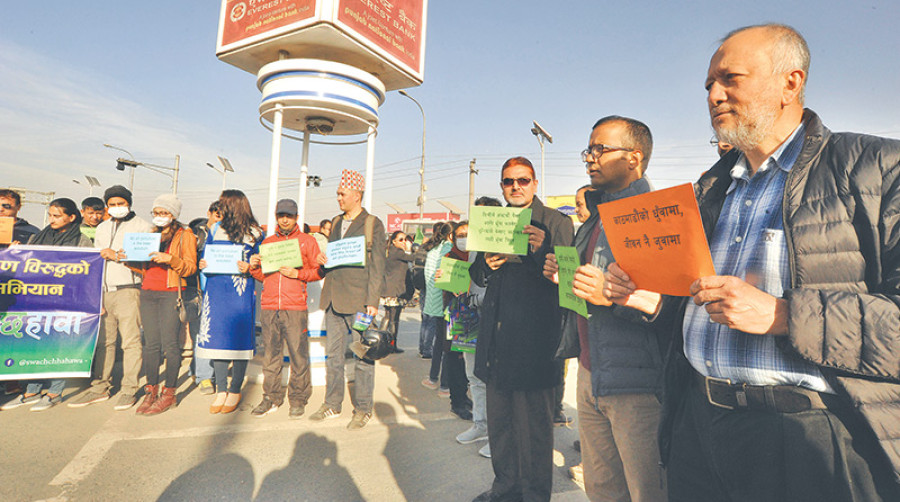National
Fund meant for fighting air pollution unused
Even as the worsening air quality poses a major health risk to people in major cities, especially Kathmandu Valley, more than Rs4.2 billion that the government has collected in taxes for fighting the menace has been sitting idle.
Chandan Kumar Mandal
Even as the worsening air quality poses a major health risk to people in major cities, especially Kathmandu Valley, more than Rs4.2 billion that the government has collected in taxes for fighting the menace has been sitting idle.
Since 2007, the government has been charging 50 paisa per litre on diesel and petrol with the objective to spend that on programmes and activities aimed at tackling air pollution in the Valley. But the fund has remained idle at the Ministry of Finance for nearly a decade now.
Environmentalists rue government’s inability to use the fund for which it was
collected.
“Countries around the world have recently started collecting such taxes. It’s been a long time since we have taken such initiative. But sadly, we have not been able to put the available resources to good use,” said Manjeet Dhakal, environmentalist and climate change expert. “The lack of coordination and understanding the seriousness of the pollution issue is a major factor behind the money still left unutilised.”
The Department of Environment (DoE), one of government bodies responsible for overseeing air pollution in the country, admits the failure to use the fund for dealing with pollution.
“The collected tax should be spent only on programmes related to mitigating air pollution. However due to the lack of proper mechanism, it is far from clear as to who should spending the fund and how,” said Durga Prasad Dawadi, director general of the DoE.
Dawadi also conceded that the department has not been able to spend its annual budget because of limited human resources.
“We are short of hands. Only having funds would count for nothing until we have the required number of staff,” said Dawadi, pointing out that the department has been unable even to spend the allocated budget. He also shared the limited manpower has made it difficult for the department to operate the existing air quality monitoring stations.
However, experts believe the money can be used in various sectors to improve Valley’s air quality, which has been worsening in recent time.
“The major cause of air pollution in Kathmandu Valley has been dust emanating from roads and vehicle emission,” Dhakal said, suggesting that the fund should be used for improving condition of the roads, buying electric public vehicles, setting up charging stations in different parts of the Valley, promoting use of bicycles by building cycle lanes, among others. “Taking such measures will go a long way in our fight to reduce carbon emission, the main agent responsible for climate change.”




 13.12°C Kathmandu
13.12°C Kathmandu














